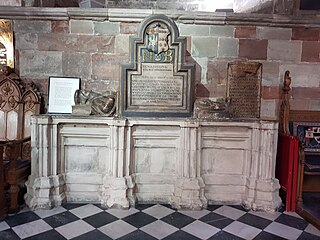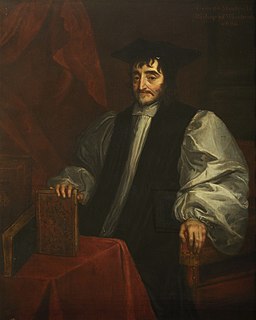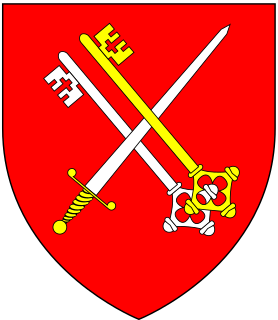
The House of Lancaster was a cadet branch of the royal House of Plantagenet. The first house was created when King Henry III of England created the Earldom of Lancaster—from which the house was named—for his second son Edmund Crouchback in 1267. Edmund had already been created Earl of Leicester in 1265 and was granted the lands and privileges of Simon de Montfort, 6th Earl of Leicester, after de Montfort's death and attainder at the end of the Second Barons' War. When Edmund's son Thomas, 2nd Earl of Lancaster, inherited his father-in-law's estates and title of Earl of Lincoln he became at a stroke the most powerful nobleman in England, with lands throughout the kingdom and the ability to raise vast private armies to wield power at national and local levels. This brought him—and Henry, his younger brother—into conflict with their cousin King Edward II, leading to Thomas's execution. Henry inherited Thomas's titles and he and his son, who was also called Henry, gave loyal service to Edward's son King Edward III.

William Paget, 1st Baron Paget of Beaudesert, was an English statesman and accountant who held prominent positions in the service of Henry VIII, Edward VI and Mary I.
Thomas of Lancaster, 2nd Earl of Lancaster, 2nd Earl of Leicester, 2nd Earl of Derby, jure uxoris 4th Earl of Lincoln and jure uxoris 5th Earl of Salisbury was an English nobleman. A member of the House of Plantagenet, he was one of the leaders of the baronial opposition to his first cousin, King Edward II.

The Battle of Boroughbridge was fought on 16 March 1322 in England between a group of rebellious barons and the forces of King Edward II, near Boroughbridge, north-west of York. The culmination of a long period of antagonism between the King and Thomas, Earl of Lancaster, his most powerful subject, it resulted in Lancaster's defeat and execution. This allowed Edward to re-establish royal authority and hold on to power for almost five more years.

Andrew Harclay, 1st Earl of Carlisle, alternatively Andreas de Harcla, was an important English military leader in the borderlands with Scotland during the reign of Edward II. Coming from a knightly family in Westmorland, he was appointed sheriff of Cumberland in 1311. He distinguished himself in the Scottish Wars, and in 1315 repulsed a siege on Carlisle Castle by Robert the Bruce. Shortly after this, he was taken captive by the Scots, and only released after a substantial ransom had been paid. His greatest achievement came in 1322, when he defeated the rebellious baron Thomas of Lancaster at the Battle of Boroughbridge on 16–17 March. For this he was created Earl of Carlisle.

PontefractCastle is a castle ruin in the town of Pontefract, in West Yorkshire, England. King Richard II is thought to have died there. It was the site of a series of famous sieges during the 17th-century English Civil War.

Nicholas Bullingham was an English Bishop of Worcester.

Roger Northburgh was a cleric, administrator and politician who was Bishop of Coventry and Lichfield from 1321 until his death. His was a stormy career as he was inevitably involved in many of the conflicts of his time: military, dynastic and ecclesiastical.

The House of Plantagenet was a Royal house which originated from the lands of Anjou in France. The family held the English throne from 1154 to 1485, when Richard III died in battle.

George Morley was an English Anglican bishop, Bishop of Worcester and then of Winchester.

Lawrence Booth served as Prince-Bishop of Durham and Lord Chancellor of England, before being appointed Archbishop of York.

The Bishop of Worcester is the head of the Church of England Diocese of Worcester in the Province of Canterbury, England.

The Bishop of Winchester is the diocesan bishop of the Diocese of Winchester in the Church of England. The bishop's seat (cathedra) is at Winchester Cathedral in Hampshire. The Bishop of Winchester holds ex officio the office of Prelate of the Most Noble Order of the Garter since its foundation in 1348, and Bishops of Winchester often held the positions of Lord Treasurer and Lord Chancellor ex officio. During the Middle Ages, it was one of the wealthiest English sees, and its bishops have included a number of politically prominent Englishmen, notably the 9th century Saint Swithun and medieval magnates including William of Wykeham and Henry of Blois.

Deane is an area of Bolton, in Greater Manchester, England. It is about 2 miles (3.2 km) south west of Bolton and 11 miles (17.7 km) northwest of the city of Manchester.
The Archdeacon of Berkshire is a senior ecclesiastical officer in the Church of England Diocese of Oxford. The archdeacon is the head of the archdeaconry of Berkshire, a post historically found within the diocese of Salisbury, and then, from 7 October 1836, within Oxford diocese.
The Archdeacon of Buckingham is the senior ecclesiastical officer in charge of the Church of England in Buckinghamshire.
Henry Bridgeman was an Anglican clergyman who served in the Church of England as the Bishop of Sodor and Man from 1671 to 1682.
Thomas Lambert, D.D. was an English Anglican priest.
Giles Lawrence, DCL was an English Anglican priest in the 16th century.
Richard Barber DCL was an English priest in 16th-century.












